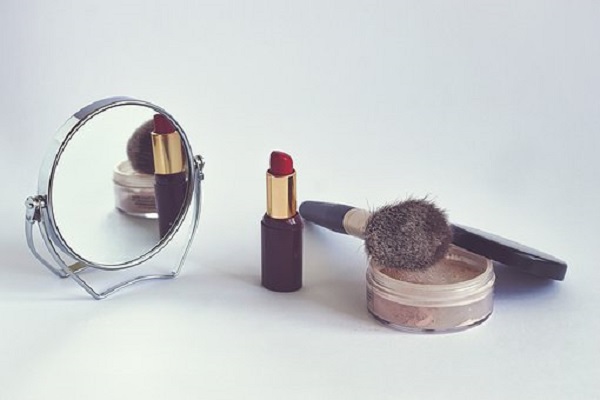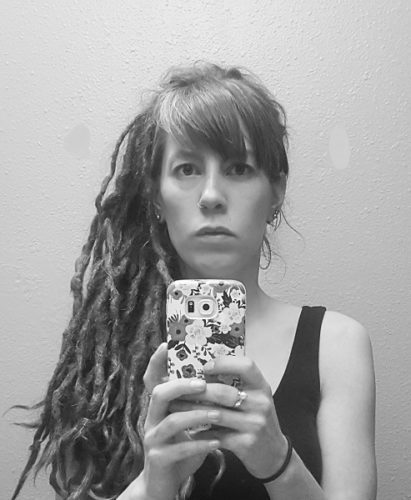I have worn makeup for the last twenty-two years. I started at age fourteen with a whole array of products–foundation, concealer, pressed powder, eyeshadow, blush, an eyelash curler, mascara. Beauty “tips and tricks” from magazines and books were consulted in these pre-internet days. Over the years, I whittled down the number of products, but makeup application remains part of my daily routine, unquestioned and automatic.
Then one day recently, I got a little tired of it.
“What if I just quit?” I asked myself.
Intellectually, I knew that I could, and it would be fine. Deep inside, though, from some secret place, nagging thoughts crept in: Will bystanders turn away in horror? Will anyone listen to me at work anymore? Will I be taken seriously as a human being worthy of existence?
I’m not exaggerating.

In a thousand ways both explicit and covert, girls and women are taught from birth that their value as a person hinges on their appearance, and how pleasing it is to others. With men in the public eye, for example, society is able and willing to focus on and value their other qualities: intellect, humor, kindness, talent–no matter what he looks like or how he uses his body. With a women, on the other hand, her appearance and physical conduct is always fair game to be remarked upon; she’s always on display, always scrutinized. Her “cultural currency” rises or falls based on physical factors.
If you took Women’s Studies 101, you’ve probably learned about the “male gaze”: women must always think of themselves as seen through the lens of others, watching her. Women learn to spend a great deal of time and energy contemplating how they appear to others–objectifying themselves–and then adorning their bodies and conducting themselves accordingly. (Whether thinking about how one appears to men or to other women, the effect is the same.)
Men act; women appear. Men gaze; women are gazed at.
You get the idea.
Couple these cultural values with my own people-pleasing personality (itself also, at least partly, the product of sexist double standards, I would argue), and here you have a woman the makeup industry salivates over. I want to be liked! I want to make people feel comfortable! I’m nice and non-threatening! I’m deeply self-conscious!
But also, I’m fundamentally lazy, and my makeup routine, simple and inexpert as it was, was taking away from my coffee-drinking and book-reading couch time in the morning in the short window between when my kids left for school and I needed to leave for work. So I just quit, and waited for the chips to fall where they may.
And…nothing happened.
No one recoiled in horror as I emerged into the public sphere. No one even remarked that I looked “tired.”
Is it possible the makeup was never helping, and I always just looked unattractive?
I fretted. I wanted to ask my husband whether he noticed, but I was too nervous. What if he said he had noticed immediately? Or what if he had never noticed, confirming that my appearance, now that we’ve been married fifteen years, doesn’t even register with him anymore? WHO AM I EVEN DOING THIS FOR???
I had to give myself a little pep talk sometimes: This is what I look like, and I don’t care what anyone else thinks. I thought of a revolutionary comment I once read in the book Beauty Sick: How the Cultural Obsession with Appearance Hurts Girls and Women by Renee Engeln, PhD. In the book, Engeln talks about how enlightened culture tries to “fight back” against the appearance pressures placed on girls and women with the message, “Everyone is beautiful.” But what if, she writes, the message was instead, “Not everyone is beautiful, and that’s okay”? In other words, instead of trying to find a way that everyone can conform to the idea that beauty equals worthiness, let’s expand the definition of an appealing woman to include those who don’t.
I also derived power from an essay I read in the midst of this little experiment: Emily Flake reflects on the ways middle-aged women, no longer deemed sexually desirable, become invisible. She gave powerful voice to many of my fears: “I’m trying to hold multiple, conflicting desires and ideas in my head and heart: It is immensely powerful not to give a ding-dang*, to be beyond the power afforded to you by other people’s desire. I still care if people think I’m pretty. I’m ashamed that I care if people think I’m pretty. I am afraid no one will listen to the things I have to say if they don’t find me pleasing to look at.” (*Except she didn’t say, “ding-dang.”)
So it turns out that while our culture does have an unhealthy focus on women’s appearance, those cultural values manifested mostly as self-doubt and anxiety in my own head.
My actual life continued to be pretty good without makeup! It was freeing to have one less thing to do in the morning! I was keeping my money instead of giving it to a beauty industry that tried to tell me I had to purchase products in order to be happy!

I finally worked up the courage to ask my husband via text if he had noticed I wasn’t wearing makeup: “Yes, but I wasn’t sure. Because you look good with or without it.” (Right answer, dude!) I might go back to wearing makeup. I haven’t decided if the short-term experiment, for which I had to screw up my courage, has legs for the long-term. I do find that the older I get, the looser the grip my chronic people-pleasing tendencies have on my psyche (maybe that’s the secret power of invisibility).
Maybe one day, in another decade or two, all the validation I need will come from my own self.











TLDR: I do not wear make-up often, but when I do I feel more confident. Should that be the case? Your thoughts?
Thank you for your article.
If I could also share how I view make-up. First, I have never been WAY into make-up (nor fashion, for what insight that may add). I have mixed feelings toward make-up and I think I have tied it to the perception of myself and how I think it will influence others’ perception of me (especially when meeting someone for the first time).
In high school and college I wore make-up basically everyday. On the rare occasion I did not get it on before leaving the house in the morning, I would take it to school and apply it between classes. However, after getting married and not working outside of the home anymore, I see no reason to wear it. That makes me wonder if I wore it because I felt more confidence and thought I was impressing the boys? (Again, this is what society tells us, as you mentioned.) For years I have not applied it regularly, just now and again, perhaps to go to church, when I started taking graduate school courses, and for business purposes. That seems shallow, as if I am trying to impress other people, but I think I really do it more for other people. However, now that I have said that, when I wear make-up I do feel more confident, presentable, and beautiful. Whether others see that from me when I wear make-up or if it is just my perception, it is hard for me to know. Then, if it does influence others, I have to decide for myself, how important it is to please society and if I think I will lose something from society by not aligning to the norm (i.e., not getting the job from an interview, not being treated with as much respect).
Thank you for letting me share my thoughts. I would be interested in hearing how others feel how make-up, their self confidence, and social pressures relate.